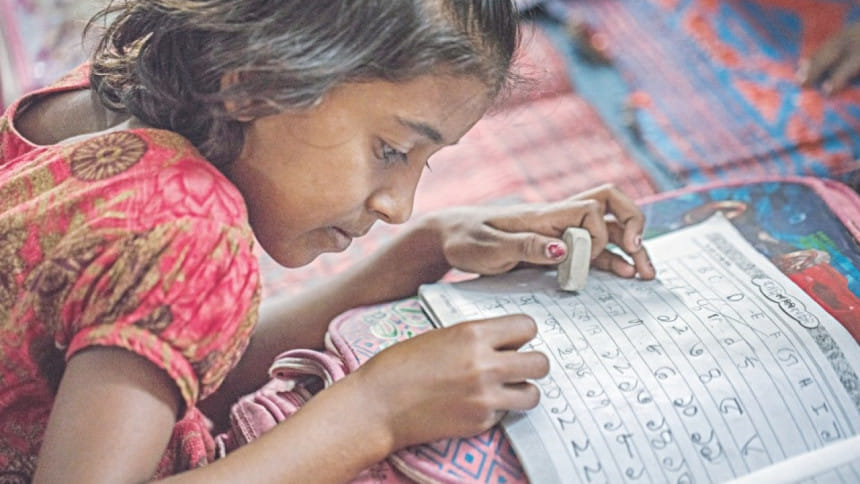Weighing the ‘why’ behind education

I once faced a question from someone I would have never imagined it to come from. It was a humid afternoon and we had assembled under the large banyan tree on the green field behind the Arts building in Dhaka University. I was trying to teach some homeless children to recognise letters from the Bangla alphabet. Hamida, a shy ten-year-old girl, suddenly asked me, "Apu, eigula shikhe ki hobe?" (Apu, what is the use of learning this?) I told her that knowing the letters would help her learn to read. "No," she said, shaking her head, "porashona-i korte hobe keno?" (Why do we need to study at all?)
I'd have thought that this would be a question I'd have no trouble answering. I was wrong. Sadly, this is one of the most basic questions concerning education today. I gave Hamida a half-hearted reply that day. I told her that we needed to study because it would be hard to support ourselves otherwise. But the answer felt wrong from the moment I uttered it out loud. I wished I'd given the little girl a more inspired answer, something that would give her a purpose to study. It took a lot of thinking for me to realise what I should have said. That little girl helped me more than I ever helped her, because her question helped me start my own search for my purpose. It got me to ask myself, "Why did I pursue an education?"
Trying to find the right answer to Hamida's question made me realise that "purpose" is perhaps the most important element of an education. I'd never actually thought about the purpose of my own education. I studied because I had to, because I was told to. With the world around us growing more chaotic by the day, I strongly feel that it is no longer enough to just tell someone, a child especially, to pursue education. We have to be able to tell them why. And the answer to this "why" is what makes all the difference.
In Bangladesh, one of the most common sayings we grew up with in our childhood is "Lekhapora kore je, gari ghora chore shey" (those who study get to ride cars). This basically means that if we study, we will grow up and earn a lot of money with which we can buy cars, build big houses, live our lives in luxury. I believe this saying holds the root to all our problems. It is why our education system is messed up. It is why some parents opt for buying exam questions illegally, it is why some teachers give more time to coaching centres than their main jobs, it is why a person succumbs to bribery, it is why even the most "educated" people cannot say "no" to corruption, it is why our youngsters today do not hesitate to harm others. It is all because everyone is after something—either money or power or social status. Chasing after these things is deeply rooted in our existing system. We have formulated our perception of success based on this. A corrupt person with a high-salaried job is more valued in our society than an honest schoolteacher. Why? How has it come to this? I believe it's because we have a flawed notion of the purpose of education.
Imagine if we'd grown up with our parents not telling us about their dream for us to become a BCS cadre with money and power, but instead inspiring us to do something with our lives to make the world a better place for humanity. If we'd grown up listening to sayings like "Lekhapora kore je, manusher upokar kore shey" or "Lekhapora kore je, bhalo kaaj kore shey" or "Lekhapora kore je, shoth manush hoi shey"—would our society be in the pathetic state that it is today? If our children are taught that the purpose of education is to build and hone one's abilities so that they can make a positive difference in the world through their work, that it will make them honest and good human beings won't they think twice before doing something bad, before hurting someone else?
Think about the students who have to struggle financially. There are countless girls and boys who, despite the struggles in our society and education system, strive to make their situation better, to help their families out of poverty. They study with the goal of earning enough money someday and not having to worry about buying food. If these children are given the chance to earn money through corrupt means, can we really blame them for not being able to turn away? What other alternative have we structured in our 48 years of independence that assures that a boy or girl from a poor family will get the opportunity they deserve for their ability and hard work? Education should mean that even a poor individual would be able to say "no" to wrongdoings. What excuse do their richer counterparts have?
In behavioural economics, there is a concept called "reference dependence". It says that people measure gains and losses in terms of what they fix as their reference point. For example, if someone's reference point is earning a twenty-five-thousand-taka salary, then earning less than that is a loss and earning more is a gain for that person. Let's think of this in terms of the purpose of education. If someone's reference point in their child pursuing an education is that it will get their child a job with a salary as high as that of the son of the neighbour next door, then anything other than that will mean their child's failure to them. In the process, the pressure, the negativity, the competition not only rob the child of happiness and destroy their love for learning, but also may drive them someday to consider taking wrong steps which they were "motivated" to consider right. Thus, no sleep is lost over a little corruption to get that high-salaried job. The reference point matters. Sometimes the wrong reference points can rob a society of the practice of ethics and morality altogether.
No matter how much we talk about quality education, it won't matter unless we rethink our purpose, our "why". If education and enlightenment do not mean the same thing, education slowly starts to lose its reliability as an influential tool in changing the world for the better. Think about it and you, like me, will realise that everything that is going wrong around us could have been different had we gotten our priorities straight—if our purpose had been pure, if it had been for the sake of humanity. So if we want to rescue our society from the current situation, we must fix our purpose of education first.
Rubaiya Murshed is a lecturer at the Department of Economics, University of Dhaka.

 For all latest news, follow The Daily Star's Google News channel.
For all latest news, follow The Daily Star's Google News channel. 



Comments